Guess Who's Coming to Dinner? (1967)
"Civil rights is one thing. This here is somethin' else..."
Sidney Poitier Weekend continues on Luke Honey’s WEEKEND FLICKS. Cinema for Grown Ups. But which film to write about? Norman Jewison’s ground-breaking In the Heat of the Night (1967)? Or To Sir, With Love (1967), the touching coming-of-age story set in an inner London comprehensive? Or, perhaps, Stanley Kramer’s Guess Who’s Coming to Dinner (1967)? I’ve gone for the latter, partly because of the superb all-round performances: Poitier is impeccable as ever, and Spencer Tracy (in his last film) and Katharine Hepburn are magnificent as the sixty-something parents.
Sidney Poitier is, of course, an inspiration. I don’t need to remind you of that. Intelligence and charm personified. Elegant, poised, dignified and thoughtful. A humanist. Born to a poor background in the colonial Bahamas, Poitier only learnt to read at the age of sixteen. An elderly Jewish waiter offered to sit up with him to read the newspaper, night after night. An extraordinary story. And Poitier, quite rightly, was a man who refused to be categorised, to be pigeonholed— to be put into some sort of box. A trait we all too often see in our own increasingly worrying and authoritarian 21st Century. Trawling through a series of splendid old television interviews on YouTube, often filmed from the comfort of Poitier’s house in Beverly Hills, I like the cut of his jib. The old-school taste in interior decoration. And the cut of his suits. Anderson and Sheppard, perhaps?
It’s a brave film, too. Guess Who’s Coming to Dinner (1967) was released in 1967— in the Summer of Love, or more accurately, the Winter of Love, as the premiere took place in December. Back in 1967, especially in America, this was radical stuff, which must have upset, even shocked the— how can I put this tactfully? — the more staid sections of American society? Where concerning inter-racial marriage (I quote from the film): “in sixteen or seventeen states, you would be breaking the law, you would be criminals…”
The film is set in San Francisco. If you’ve yet to go there, I urge you to jump on an aeroplane as quickly as possible, as it’s a marvellous place, despite the rather British, rainy, foggy climate. Everybody thinks ‘California’, which means Sun, Oranges, Hollywood— and Murder. But that’s Southern California. That’s Los Angeles, San Diego and Palm Springs. Northern California is actually rather different. Green, misty and mysterious. A bit like Wales. Think The Birds (1963). And the San Franciscan hills are extraordinary. Until you’ve seen them in real life, it’s difficult to explain quite how steep they are. And there are Victorian trams. And clapboard buildings. And an evocative Chinatown with excellent Chow Mein. And the most wonderful museum of working, antique fairground and seaside penny-in-the-slot machines, The Musée Mécanique on Pier 45, which might possibly be one of my all-time favourite museums in the world. And there’s a sort of charming and endearingly corny hipster thing going on in Haight-Ashbury, where according to that fountain of truth, Wikipedia, a lively, diverse crowd (looks) to soak up the historic hippie vibe…’
Anyway. Matt Drayton (Spencer Tracy) is a rich, influential, and liberal newspaper publisher with a framed photograph of Franklin D. Roosevelt on his desk. And he lives in a splendid house with a white facade, black louvred shutters, and a pretty terrace looking out over a painted backdrop of the bay. It’s all rather understated and old-moneyish, with grey walls and early 20th-century Modern paintings in Impressionist frames illuminated with picture lights; Chinese antiques and silver, and the obligatory, and slightly dubious bar cart. There’s a Modigliani.
Matt’s married to Christian (Katharine Hepburn), who owns— and runs— a smart art gallery. You get the picture. As I get older and enter the final years of Late Youth, I appreciate Katherine Hepburn more and more. Isn’t she marvellous? Altho’ watching her on YouTube, on a Dick Cavett out-take (i.e. off-camera) from 1973, she’s impossible. I mean, bloody difficult. We’ve covered two Katharine Hepburn films so far, Bringing Up Baby (1938) and Summertime (1955). I’m not entirely convinced, though, by On Golden Pond (1981), a rather mawkish film, which was huge at the time, and everybody went nuts for— it won God knows how many awards. Although, of course, I would be delighted if you left a comment to prove me wrong.
Enter daughter Joanna (Katharine Houghton), who turns up unexpectedly with her brand new fiancé, a man she only met ten days before. Dr. (John) Prentice (Sidney Poitier) is, in so many ways, perfect son-in-law material. He’s good-looking, distinguished and courteous. A man of integrity with a distinguished career at the John Hopkins Research University, Yale Medical School, the London School of Tropical Medicine, and an important position at the World Health Organisation. Married before, but wife and child killed in a tragic accident. And he happens to be black.
Katherine Houghton is beautifully cast. She’s like a young Katharine Hepburn (at least in looks). Full of beans. A girl who knows her own mind, innocent, without an agenda, with all the naivety of youth. And Spencer Tracy’s splendid as Matt, the craggy, crotchety patriarch, a ‘broken-down, phoney liberal come face to face with his principles’. But there’s prejudice from all sides— apart from Monseigneur Ryan (Cecil Kellaway), a wise old bird and friend of the family, and to a lesser extent from the two mothers— prejudice from Hilary St. George (Virginia Christine), the bitchy art gallery ‘friend’; from Tillie (Isabel Sanford), the housekeeper, a plain-talkin’ and God fearin’ woman, and from Dr. Prentice’s mailman father, (Roy E. Glenn Sr.). Like the servants in Upstairs Downstairs, they’re as bad as each other. Hilary aside, these are fundamentally decent and loveable people— very much creatures of circumstance and products of their time. I read a few online reviews in preparation for this post, and I’m struck by how younger reviewers find certain aspects of Guess Who’s Coming to Dinner, I quote, ‘cringe-worthy’. Funnily enough, I don’t. I mean, you need to view films in the context of their day. And 1967 was a very different place, with very different values. That’s some fifty-seven years ago. As far away as 1910 was from 1967.
Tracy and Hepburn are terrific together. Especially in that bit when they go out in their Plymouth Valiant, and crotchety old Spence spars with a sullen teenage waitress at a drive-in ice cream parlour. Over the Oregon Boysenberry ice cream. They're like a genuine older couple. It's not surprising, really, considering their on-off affair, an open secret in Hollywood that lasted for twenty-six years. But it suddenly occurred to me that they're rather elderly parents for a daughter of twenty-three. Tracy was sixty-seven and Hepburn sixty. And Tracy was seriously ill at the time (years of alcohol and nicotine had finally taken their toll) and died only seventeen days after filming.
Guess Who's Coming to Dinner (1967) is touching, eloquent, and beautifully made. And honest, too. Life-affirming stuff. It's one of those films I appreciate now much more than when I first saw it in my twenties. And, of course, there's not a dry eye in the house, partly encouraged by Katharine Hepburn's unfortunate conjunctivitis, supposedly caught from that Venetian canal scene in Summertime (1955). But, as a film, it needs to be viewed in the context of the time it was made. With reserved judgement. But then, I suspect that if you have read this far and have an interest, appreciation and understanding of history, that's taken as read. Guess Who’s Coming to Dinner: it’s a buy.
I watched Guess Who’s Coming to Dinner (1967) on Amazon Prime Video Download, which cost me £3.49 to rent. I’ve got a DVD somewhere, but I couldn’t find it. My DVD collection is disorganised. It’s also available on Blu-ray.
A big thank you to all those of you who have subscribed. How are we doing? I started Luke Honey's WEEKEND FLICKS. Cinema for Grown Ups, back in December 2023— inspired by those vintage indents for London Weekend Television. That feel-good feeling on a late Friday afternoon when boring, worthy old Thames Television handed over to the racier LWT. My bright idea (which occurred to me in the bath) was to recommend two films over the weekend, with the rule that all the films should be readily available, either on DVD, or preferably instant download. I know that these old films have brought me a great deal of pleasure over many years, and I’m hoping that I can inspire you to watch something you may have forgotten about, or sometimes, might not even have come across. As most of these films are no longer shown on television, the urge becomes more pertinent.
We're now passed 500 subscribers, with 7,000 views (plus) over the last 30 days. It's bloody hard work (7.00 am sharp, a crawl to the computer, a cup of strong black coffee and calluses on my fingers), but I enjoy it immensely. We're currently on film no. 74.
So what do you get? There are two possibilities on WEEKEND FLICKS: 'Paid-for' subscribers get an extra, exclusive film recommendation every Friday morning, plus full access to the complete archive— which should list over a hundred films by the end of the year. It costs £5 a month (or £50 a year)— a bargain, frankly, when you compare it to a few cups of coffee, a packet of semi-legal gaspers or a pint of beer in the pub. 'Free' subscribers get access to the Sunday newsletter, plus the 'free subscriber' films in the archive. Either option is a good bet.
In the meantime, sit back, mix a cocktail— and have a relaxing and cinematic Sunday evening. And enjoy Guess Who’s Coming to Dinner (1967). It’s beautifully made.


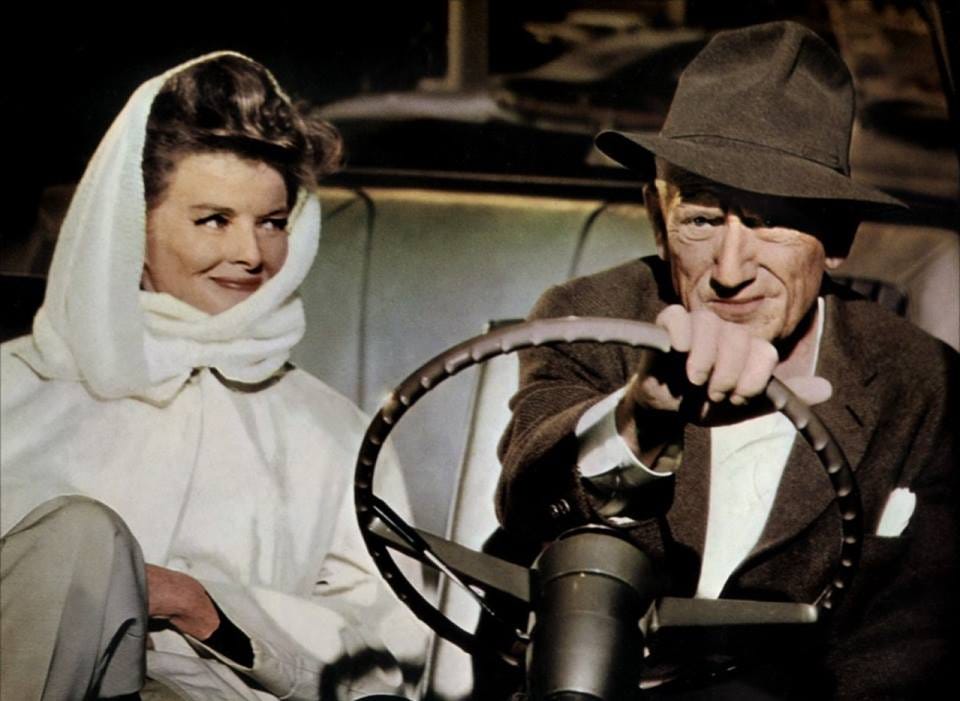

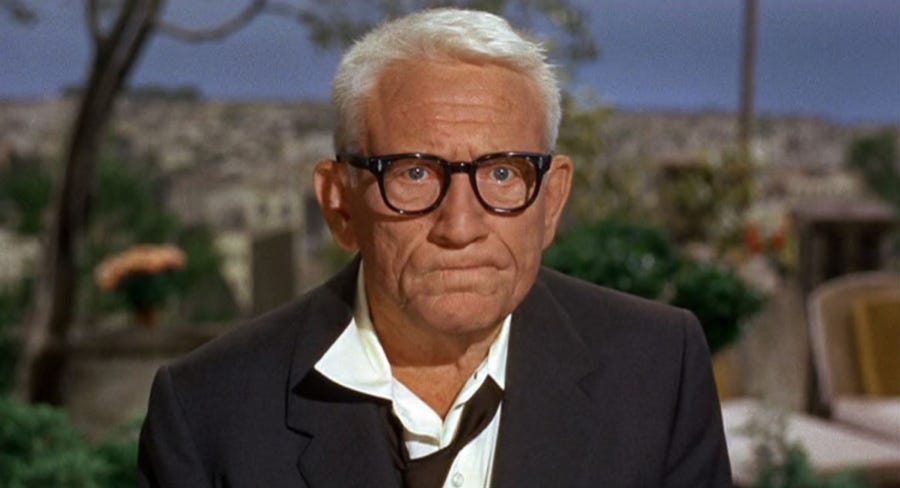
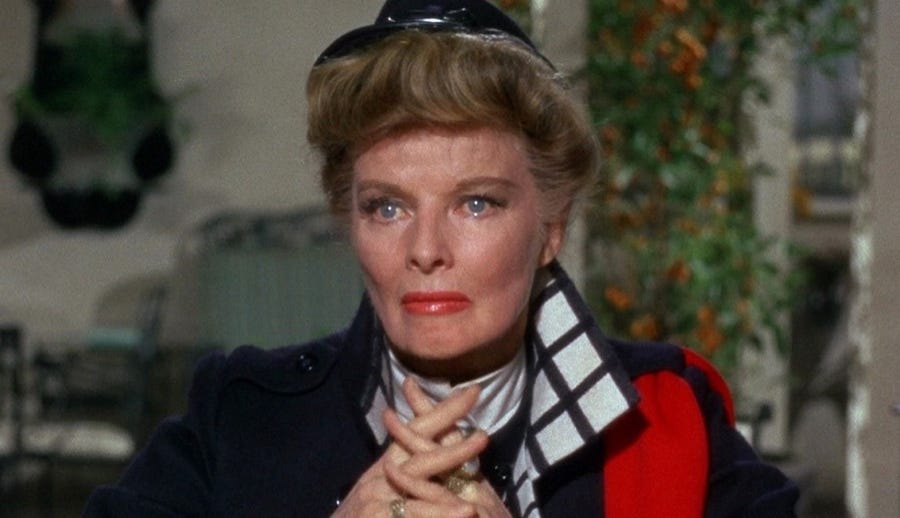
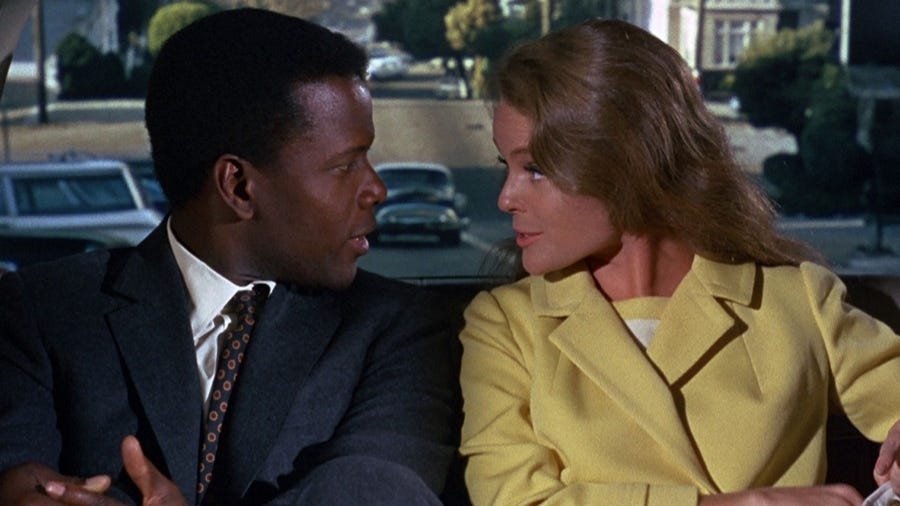

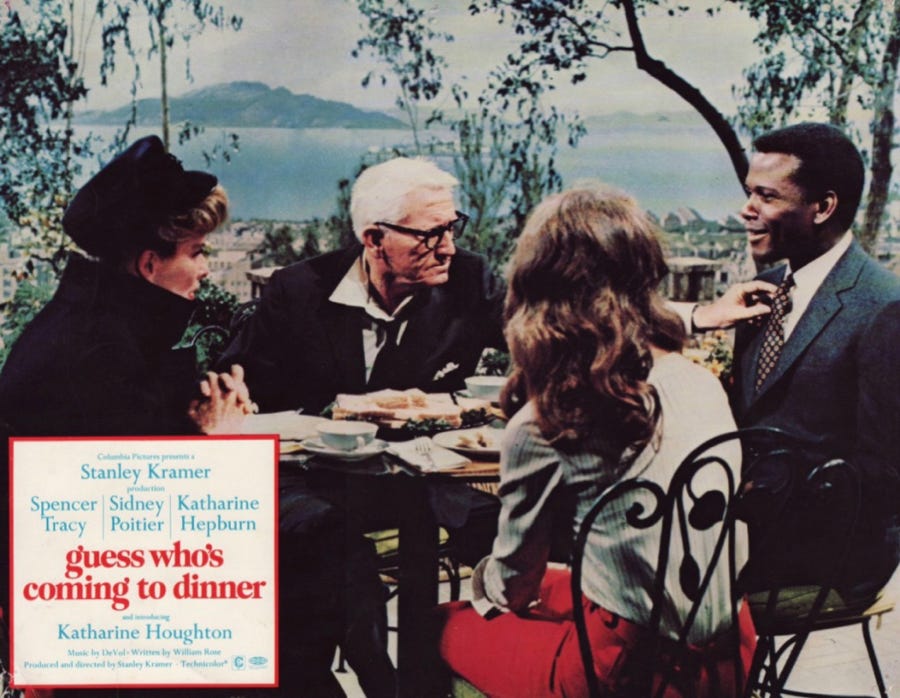
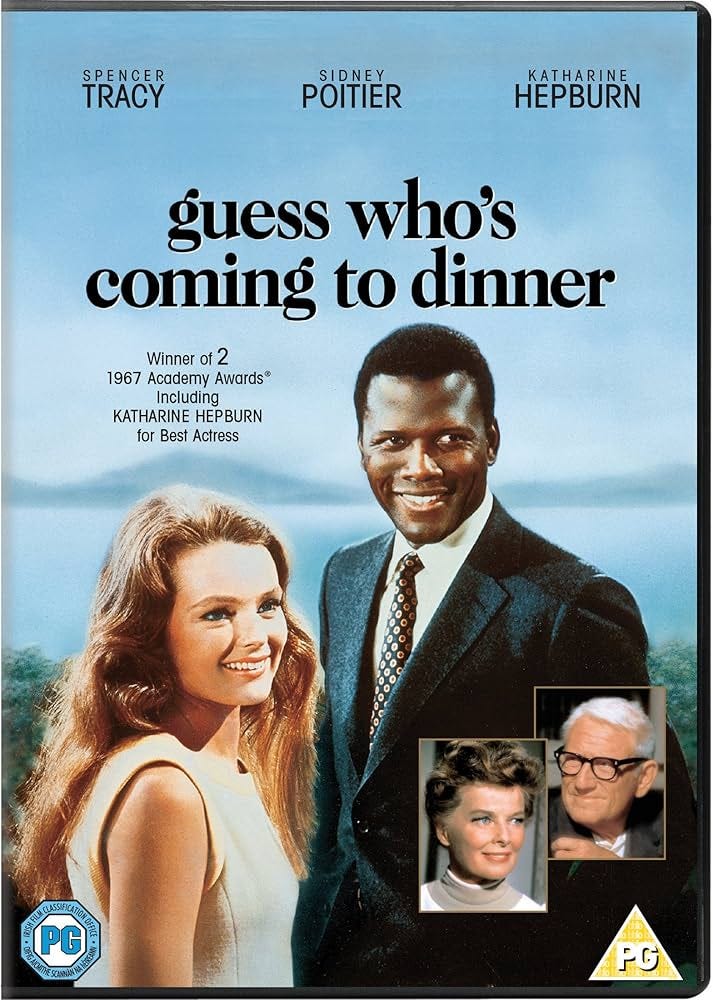
YES! When you teased it on Friday I was hoping you’d cover this film over the other two (also incredible) films. I, too, am flummoxed over younger generations “hot take” of this film. Apparently everything must now be seen through a lens of modern day appropriateness instead of using it as essential learning about the past (culture, politics, life!). This film is a perfect second act in my opinion to Desk Set filmed ten years earlier with Tracy and Hepburn. I love their chemistry in both and the ending is all the more poignant when you realize he died shortly thereafter.
The scene in the driveway with terrible Hilary is impeccable. It shows off Hepburn’s talent - and as a woman in her 60s still headlining a film - that’s still an achievement today!
Great film and one of Hepburn's perfect turns. She can be grating (my husband finds her supremely annoying, lol) but not here. I agree on Golden Pond... and now that I'm older, I roll my eyes even more. Very annoying that attitude of pushing every inch on the past through today's colander. What are people going to say about today's moral certainties in 50 years?